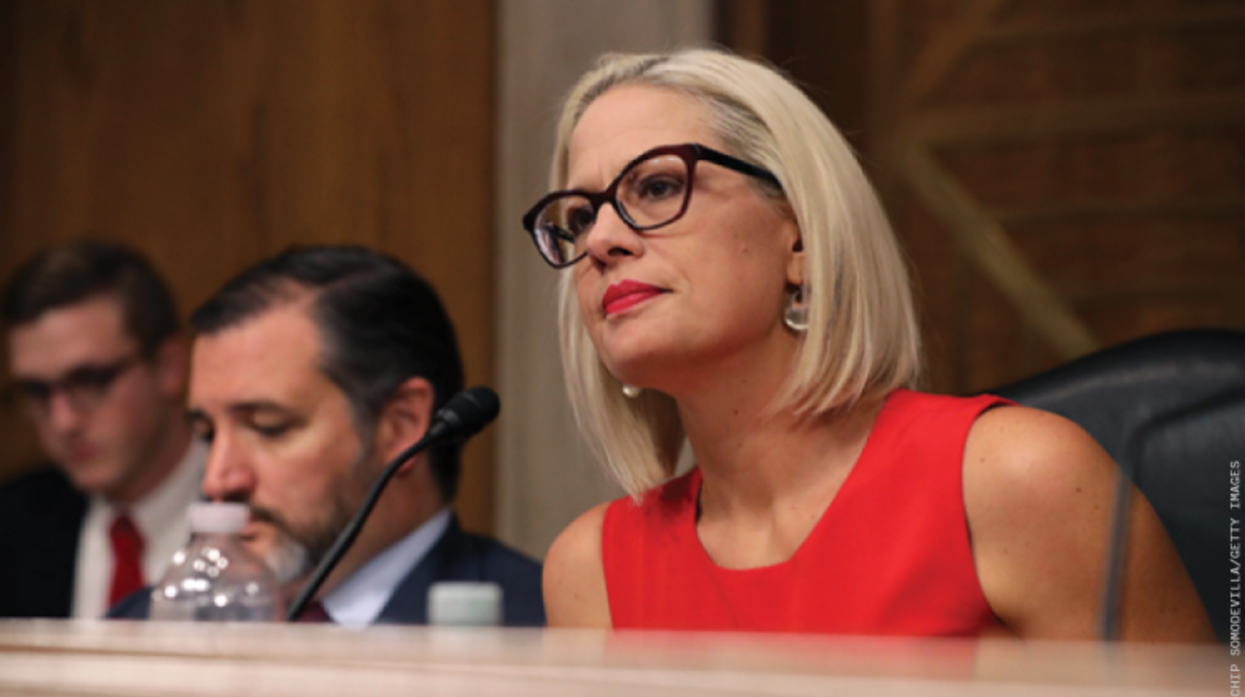Two years into her term in the U.S. Senate, Kyrsten Sinema, the chamber's first out bisexual member, has bewildered and angered many of her supporters.
Sinema, previously a member of the U.S. House and before that an Arizona state lawmaker, has consistently received support from the LGBTQ+ community and voters concerned with other progressive causes. But she has turned out to be one of the two most conservative Democrats in the Senate, the other being Joe Manchin of West Virginia, and their actions could end up blocking the most sweeping piece of pro-LGBTQ+ legislation ever proposed at the federal level.
That's the Equality Act, which would ban discrimination based on sexual orientation or gender identity in employment, housing, public accommodations, federally funded programs, and many other aspects of life. It's already been passed by the House, but approval by the Senate is far from certain.
If the Equality Act needed just a simple majority to pass the Senate, that would be no problem. The chamber has 48 Democrats and two independents who caucus with them. If all of them voted for the act, which is likely, even if all 50 Republicans voted against it, Vice President Kamala Harris would cast a tie-breaking vote (in favor, of course).
But most of the legislation that comes before the Senate has to overcome a procedural barrier known as the filibuster before it goes to a vote. The filibuster no longer means a senator holding up action while speaking for hours without interruption, like Jimmy Stewart in Mr. Smith Goes to Washington; it now simply means that no vote on a bill can be held until 60 senators vote to end debate on it. Many senators want to get rid of the filibuster -- but not Sinema and Manchin.
Sinema and Manchin have received plenty of criticism for this stand, along with their opposition to President Biden's Build Back Better plan. The criticism of Sinema has been particularly harsh, as liberal activists expected more of her than they ever did of Manchin. Groups such as the Working Families Party and Living United for Change in Arizona have protested against Sinema -- immigration activists even filmed her and followed her into a restroom at Arizona State University, where she's a lecturer.
Sinema is going against the people who elected her, says Natalia Salgado, director of federal affairs for the Working Families Party, which often works within the Democratic Party. For Sinema to stand in the way of progressive legislation "is untenable to us," Salgado says.
Far-right, anti-LGBTQ+ activists, however, are only too happy that Sinema wants to maintain the filibuster. Brian Brown, president of the National Organization for Marriage, recently sent an email to his supporters asking them to encourage Sinema and Manchin to continue backing the filibuster, as it "has blocked much of [Biden's] agenda from advancing -- including the disastrous Equality Act."
The Advocate has requested an interview with Sinema, and so far she hasn't responded. She did defend her support for the filibuster in a Washington Post commentary piece in September. The Democrats have not always held a majority in the Senate, she said, and when they've been in the minority, the filibuster has helped block Republican-backed legislation. Overall, she wrote, it has forced bipartisan cooperation. "The filibuster compels moderation and helps protect the country from wild swings between opposing policy poles," she said.
Some LGBTQ+ activists are reluctant to discuss Sinema on the record, but they have pointed out that there's a way to pass the Equality Act even with the filibuster intact. Their hope is that 60 senators, including Republicans, can be moved to end debate and then vote on the act itself.
Democratic and independent support for the act is solid; 49 of those 50 senators, including Sinema, have signed on as cosponsors. Manchin is the lone holdout, but he voted for the Equality Act's predecessor, the Employment Non-Discrimination Act, in 2013, so political observers think he'll come through again. ENDA passed the Senate that year but never became law, as it went nowhere in the House.
Republican senators who might be persuaded include those often considered moderate, such as Susan Collins of Maine, Lisa Murkowski of Alaska, and Rob Portman of Ohio. Others being talked about include Richard Burr and Thom Tillis of North Carolina, Pat Toomey of Pennsylvania, even Florida's Marco Rubio. But getting to 60 remains a challenge.
Another option is seeing what the 2022 midterm races bring. Fourteen Democratic Senate seats and 20 Republican ones are up for election, along with all House seats. The president's party often loses congressional seats in the first midterms after the president takes office, but if Democrats could break that pattern and increase their Senate and House majorities, it would boost the Equality Act's chances.
Many LGBTQ+ Americans are not inclined to wait for equality, however. So activists will undoubtedly still push Sinema and Manchin on the filibuster -- and try to turn a few Republicans into equality supporters.
This story is part of The Advocate's 2021 People of the Year issue, which is out on newsstands December 1, 2021. To get your own copy directly, support queer media and subscribe -- or download yours for Amazon, Kindle, Nook, or Apple News.




































































Charlie Kirk DID say stoning gay people was the 'perfect law' — and these other heinous quotes